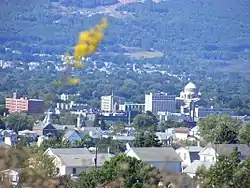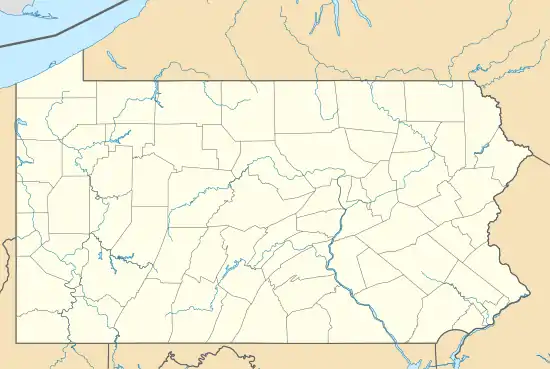Laurel Run, Pennsylvania | |
|---|---|
Borough | |
 A view of Wilkes-Barre from Giants Despair Mountain (in Laurel Run) | |
 Location of Laurel Run in Luzerne County, Pennsylvania | |
 Laurel Run  Laurel Run | |
| Coordinates: 41°13′02″N 75°50′29″W / 41.21722°N 75.84139°W | |
| Country | United States |
| State | Pennsylvania |
| County | Luzerne |
| Incorporated | 1881 |
| Government | |
| • Type | Borough Council |
| Area | |
| • Total | 5.10 sq mi (13.21 km2) |
| • Land | 5.10 sq mi (13.21 km2) |
| • Water | 0.00 sq mi (0.00 km2) |
| Population | |
| • Total | 558 |
| • Density | 109.39/sq mi (42.23/km2) |
| Time zone | UTC-5 (Eastern (EST)) |
| • Summer (DST) | UTC-4 (EDT) |
| Area code | 570 |
| FIPS code | 42-41848 |
| Website | {{}} |
Laurel Run is a borough that is located in Luzerne County, Pennsylvania, United States. The population was 560 at the time of the 2020 census.[3]
History
Laurel Run was incorporated as a borough in 1881. The borough is home to one of the oldest continuing motorsport events in Pennsylvania. Since 1906, the annual Giants Despair Hillclimb has challenged motorists to race uphill on a one-mile stretch of East Northampton Street.[4]
In 1915, a mine fire started in the borough's Red Ash mine. The mine was excavated and, although the fire was declared extinguished in 1973, the fire is still burning.[5]
Approximately 166 homes, two grocery stores, a church, a school, and a lumberyard were razed and relocated through a program administered by the Appalachian Regional Commission.
Geography
Laurel Run is located at 41°13′2″N 75°50′29″W / 41.21722°N 75.84139°W (41.217222, -75.841456).[6]
According to the United States Census Bureau, the borough has a total area of 5.2 square miles (13.4 km2), all land. The borough is sparsely populated. Most of Laurel Run consists of mountainous forests.
Laurel Run, a tributary of Mill Creek, flows through much of the borough.
Demographics
| Census | Pop. | Note | %± |
|---|---|---|---|
| 1890 | 696 | — | |
| 1900 | 696 | 0.0% | |
| 1910 | 790 | 13.5% | |
| 1920 | 774 | −2.0% | |
| 1930 | 944 | 22.0% | |
| 1940 | 1,057 | 12.0% | |
| 1950 | 858 | −18.8% | |
| 1960 | 855 | −0.3% | |
| 1970 | 327 | −61.8% | |
| 1980 | 725 | 121.7% | |
| 1990 | 708 | −2.3% | |
| 2000 | 723 | 2.1% | |
| 2010 | 500 | −30.8% | |
| 2020 | 560 | 12.0% | |
| 2021 (est.) | 563 | [3] | 0.5% |
| Sources:[7][8][9][2] | |||
At the time of the 2000 census, there were 723 people, 277 households, and 188 families living in the borough.
The population density was 140.9 inhabitants per square mile (54.4/km2). There were 292 housing units at an average density of 56.9 per square mile (22.0/km2).[8] The racial makeup of the borough was 99.45% White, 0.28% African American, 0.14% Native American, and 0.14% from two or more races. Hispanic or Latino of any race were 0.28% of the population.
There were 277 households; 31.4% had children under the age of eighteen living with them, 54.2% were married couples living together, 7.9% had a female householder with no husband present, and 31.8% were non-families. 27.4% of households were made up of individuals, and 9.0% were one-person households with residents who were aged sixty-five or older.
The average household size was 2.43 and the average family size was 3.01.
The age distribution was 19.4% of residents who were under the age of eighteen, 8.3% who were aged eighteen to twenty-four, 30.7% who were aged twenty-five to forty-four, 29.9% who were aged forty-five to sixty-four, and 11.8% who were aged sixty-five or older. The median age was forty years.
For every one hundred females, there were 112.0 males. For every one hundred females who were aged eighteen or older, there were 113.6 males.
The median household income was $35,781 and the median family income was $40,455. Males had a median income of $28,611 compared with that of $24,500 for females.
The per capita income for the borough was $17,066.
Approximately 8.8% of families and 8.5% of the population were living below the poverty line, including 11.0% of those who were under the age of eighteen and 11.8% of those who were aged sixty-five or older.
Gallery
 Laurel Run, c. late 1800s or early 1900s
Laurel Run, c. late 1800s or early 1900s Borough municipal building
Borough municipal building
References
- ↑ "ArcGIS REST Services Directory". United States Census Bureau. Retrieved October 12, 2022.
- 1 2 "Census Population API". United States Census Bureau. Retrieved Oct 12, 2022.
- 1 2 Bureau, US Census. "City and Town Population Totals: 2020—2021". Census.gov. US Census Bureau. Retrieved August 4, 2022.
- ↑ Nardone, Ralph (May 30, 2006). "Giant's Despair Hill Climb marks centennial". Northeast Business Journal. Northeast PA Business Journal. Archived from the original on February 4, 2014. Retrieved 2009-06-16.
- ↑ "PAFireLocationTable" (PDF). Pennsylvania Department of Environmental Protection. 2020-10-01. Retrieved 2021-02-06.
- ↑ "US Gazetteer files: 2010, 2000, and 1990". United States Census Bureau. 2011-02-12. Retrieved 2011-04-23.
- ↑ "Census of Population and Housing". U.S. Census Bureau. Retrieved 11 December 2013.
- 1 2 "U.S. Census website". United States Census Bureau. Retrieved 2008-01-31.
- ↑ "Incorporated Places and Minor Civil Divisions Datasets: Subcounty Resident Population Estimates: April 1, 2010 to July 1, 2012". Population Estimates. U.S. Census Bureau. Archived from the original on 11 June 2013. Retrieved 11 December 2013.
